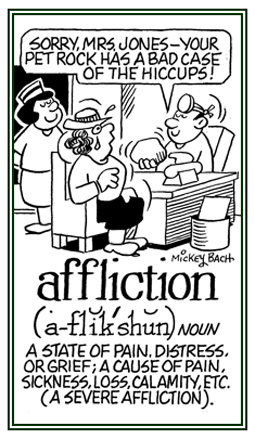-tion
(Latin: a suffix forming nouns from verbs of condition and action; an act or process: resumption, absorption; state or condition, redemption, exhaustion; something resulting from or otherwise related to an act or process, assumption, friction)
This unit is presenting a small fraction of the hundreds of words ending with the suffix of -tion; however, there is a significant number of words which may help everyone have a better understanding and appreciation of the use of this element.
2. The conditions of being overwhelmed or uncontrollably committed to causes or to special objectives: Amy's main addiction is her excess devotion to operas where she spends a great deal of time and expenses attending them as often as possible.
Sally had an addiction for buying clothes, shoes, purses, and other items even though she didn't need them and didn't have enough space to put them where she could access them, as a result, she had very little money for other necessities; such as, food, making her car payments, paying her rent, etc.
3. Situations that involve compulsions and the need to continue taking drugs as a result of taking them in the past: Greg was trying to follow his doctor's advice to stop his crack addiction which he had had for years. Getting away from his old friends, who also had the same addictions, was extremely difficult and hindered him from turning away from that type of life.For more information, see these compositions: Addicts and Addiction.
It is possible that a man could live twice as long if he didn't spend the first half of his life acquiring habits (addictions) that shorten the other half.
2. Inclusion or being part of a group: The addition of a baby to the household changed their lives.
3. Increase, enlargement, extra: The addition in cost over last year’s tuition is $500.
4. Annex, extension, adjunct: The addition to the town library will double its size.
2. The size, style, or form in which a book is published: The publisher also printed a smaller "pocket edition".
The index was a new addition to the latest edition of the textbook.
2. The action of bringing something forward as a fact or a statement.
2. A term for a situation in which adult animals take over the care of young that are not their own offspring: Sometimes baby creatures are adopted and raised by another creature of the same kind.
2. The conveyance of an atmospheric property caused by the horizontal movement of air: The transfer of heat, humidity or moisture, or salinity, which are some properties carried through the motion of the air, is known as advection.
3. The horizontal movement of water, as in an ocean current: Advection is important for the precipitation of rain, snow, etc. from clouds, or for the formation of shaping of such orographic clouds.
Robert is convinced that his faith in God helped him to endure many afflictions, including nearly being killed while he was serving in the war as a soldier.
2. Etymology: from Latin afflictus, "cast down, wretched".
Go to this Word A Day Revisited Index
so you can see more of Mickey Bach's cartoons.
2. A traditional formal question directed by a court to a defendant convicted of a felony before sentencing, asking whether or not the defendant has anything to say regarding why the sentence should not be pronounced against him or her: "I believe that to have interfered as I have done, as I have freely admitted I have done, in behalf of God's despised poor, I did no wrong, but right. Now, if this court should deem it necessary that I should forfeit my life for the furtherance of the ends of justice . . . I say let it be done."
So went the court room allocution of John Brown, American hero to the slaves.
2. The object, state, goal, or result aspired or sought after: To be a professional baseball player has been Jim's life-time ambition.
3. A need or urge for an activity: Jerry and Jane have no ambition to go dancing this evening; so, they are staying home.
Word History
Even in ancient Rome candidates for public office went around soliciting votes. This activity was indicated by the word ambitio, "a going about, going around".
Ambitio was derived from ambire, "to go about", which in turn was formed from amb-, "about", and ire, "to go". Since this activity indicated a desire for honor or power, the word ambitio came to mean the desire for official honors.
This word was borrowed in French and English as ambition, and its meaning broadened to denote the earnest desire for achievement.
2. Opposing moral perversion, degeneracy, and depravity.
3. Working against the destruction of honesty or opposed to undermining moral integrity.
4. Making efforts to stop the bribery of public officials who are willing to violate their proper responsibilities as office holders: "Australia's anti-corruption for development policy provides a framework for planning, resourcing, and reviewing anti corruption activities on a country and regional basis. Australia's approach to anti-corruption will focus on three mutually reinforcing elements."
5. Making efforts to stop decay or progressive putrescence, rottenness, or decay: "Keeping meat, dairy products, etc. in the refrigerator before consumption is a form of anticorruption."


